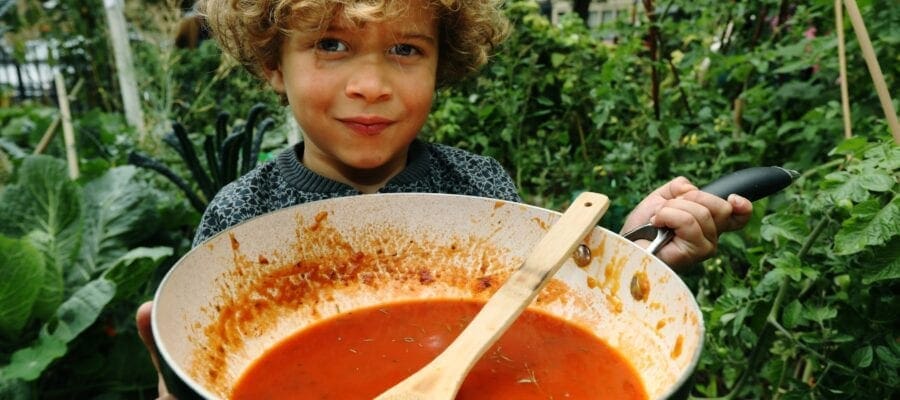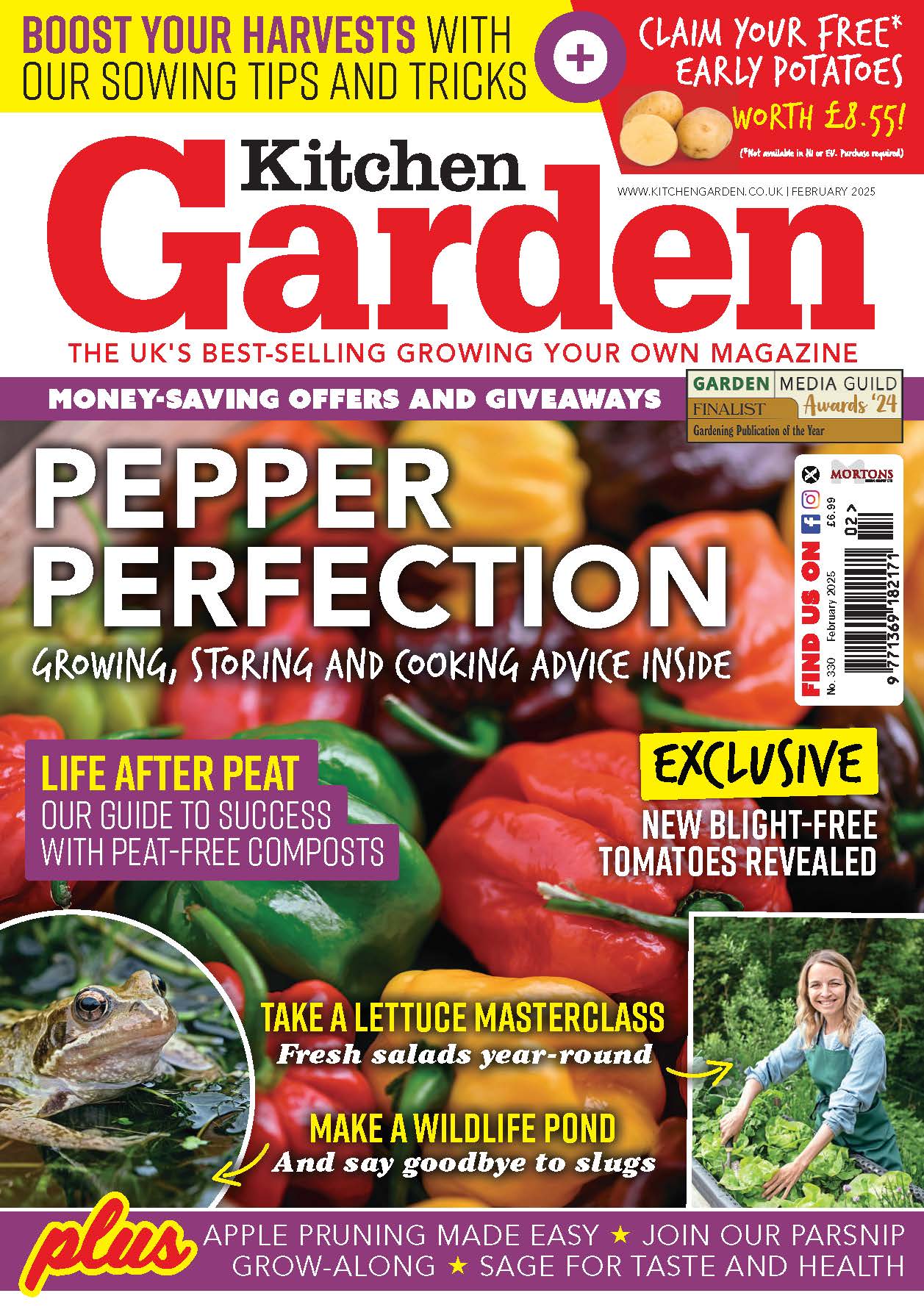Find out more in the latest KG Subs Club news – for subscribers only
Schools serve up their garden skills
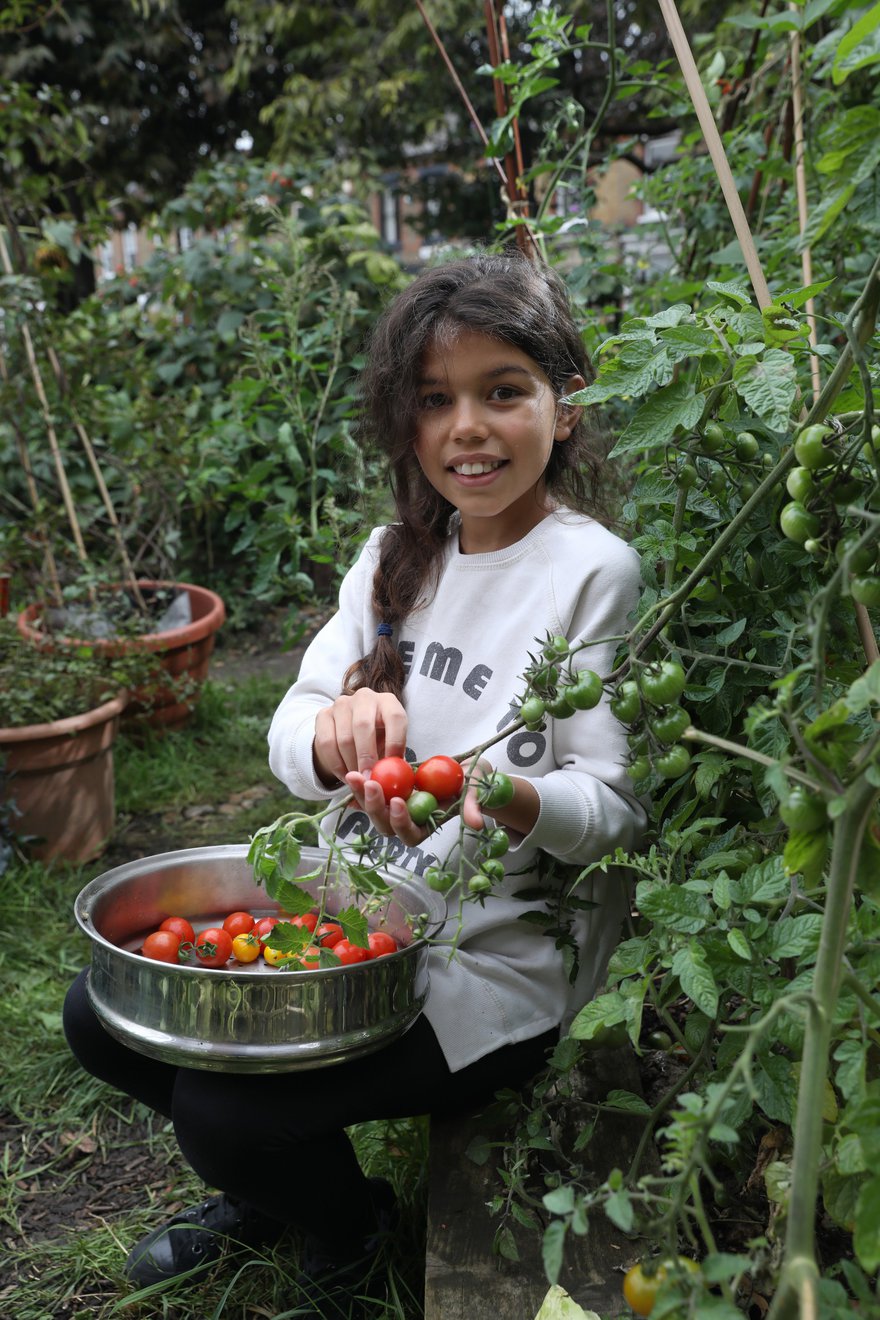
Pupils at Columbia Primary School taking part in the Big Soup Share. Pictures: RHS/Luke MacGregor
More than 1000 schools and youth groups are taking their harvest from plot to plate for the Big Soup Share, a UK-wide week of events from October 2 to 8 to celebrate the 10th anniversary of the RHS Campaign for School Gardening. Over 75,000 pupils are harvesting their produce, devising soup recipes and cooking up a feast to share with classmates, friends and families.
The RHS Campaign for School Gardening calls for all children to be given the chance to garden, and 34,000 schools – 69% of primaries and 79% of secondaries – are now signed up. Information, lesson plans and advice is provided online and backed up by support from the RHS Education Team and Campaign for School Gardening Regional Advisors. A survey to mark the anniversary has found that 96% of schools feel that gardening has enabled young people to connect with nature, and 83% and 82% respectively feel it has improved their mental and physical wellbeing.
Ingrid Chen, gardening lead at Columbia Primary School in Tower Hamlets, London, says: “Our children love the school’s edible garden and have got stuck into all sorts of tasks with gusto: from raising tiny seedlings to harvesting crops; sorting worms from compost, to cooking homegrown feasts to share with neighbours.
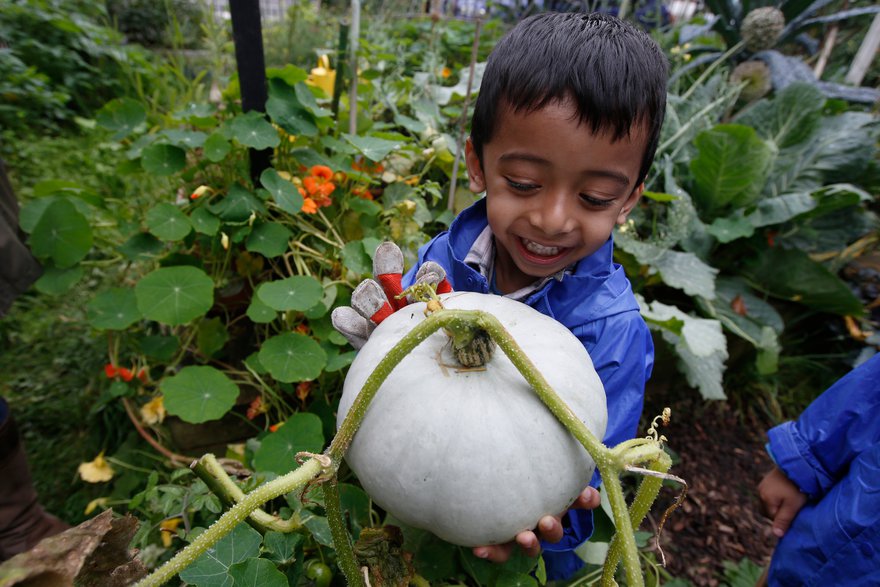
“We started with a patch of grass just over two years ago and have built and improved this garden with help from pupils, their families and more recently the wider local community. It’s a fantastic resource to enhance classroom-based activities in all areas of learning, as well as a lovely opportunity for children to care for a green space and observe nature which many do not otherwise have. It’s now a community hub, and hopefully the launch pad for the next generation of gardeners.”
Find out more at http://press.rhs.org.uk/RHS-Outreach/Press-releases/Schools-Serve-Up-to-Show-Off-their-Gardening-S-(1).aspx
Natural health service
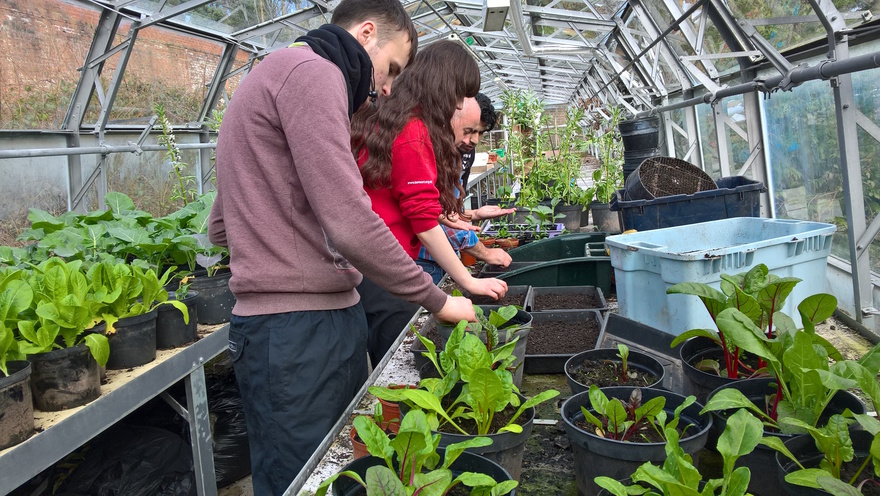
Natural health service: improving people’s well-being. Picture: Alan Wright/The Wildlife Trusts
A new study of the effects of volunteering in nature on mental health has found a positive impact on more than two-thirds of participants. The study, carried out by the University of Essex and The Wildlife Trusts, found even higher benefits for those who had poor levels of mental health to start with, with 95% of this group reporting an improvement within six weeks. Participants also reported better general health.
The study, The Health and Wellbeing Impacts of Volunteering with The Wildlife Trusts, assessed changes in 139 participants’ attitudes, behaviour and mental wellbeing over the course of 12 weeks during which they took part in nature conservation activities. Most of the participants were attending projects because of a health or social need, such as a mental health problem or issues with loneliness or inactivity.
Dominic Higgins, Nature and Wellbeing Manager at The Wildlife Trusts, says: “The results of this structured research project make a powerful case for nature having a larger role in people’s everyday lives. The evidence is loud and clear – volunteering in wild places while being supported by Wildlife Trust staff has a clear impact on people’s health; it makes people feel better, happier and more connected to other people. Participants also reported increases in their sense of connection to nature. The Department of Health should take note – our findings could help reduce the current burden on the National Health Service because they illustrate a new model of caring for people that does not rely solely on medication and traditional services.”
Find out more at http://www.wildlifetrusts.org/news/2017/10/02/new-report-links-volunteering-nature-better-mental-health
Butterfly numbers up – despite count
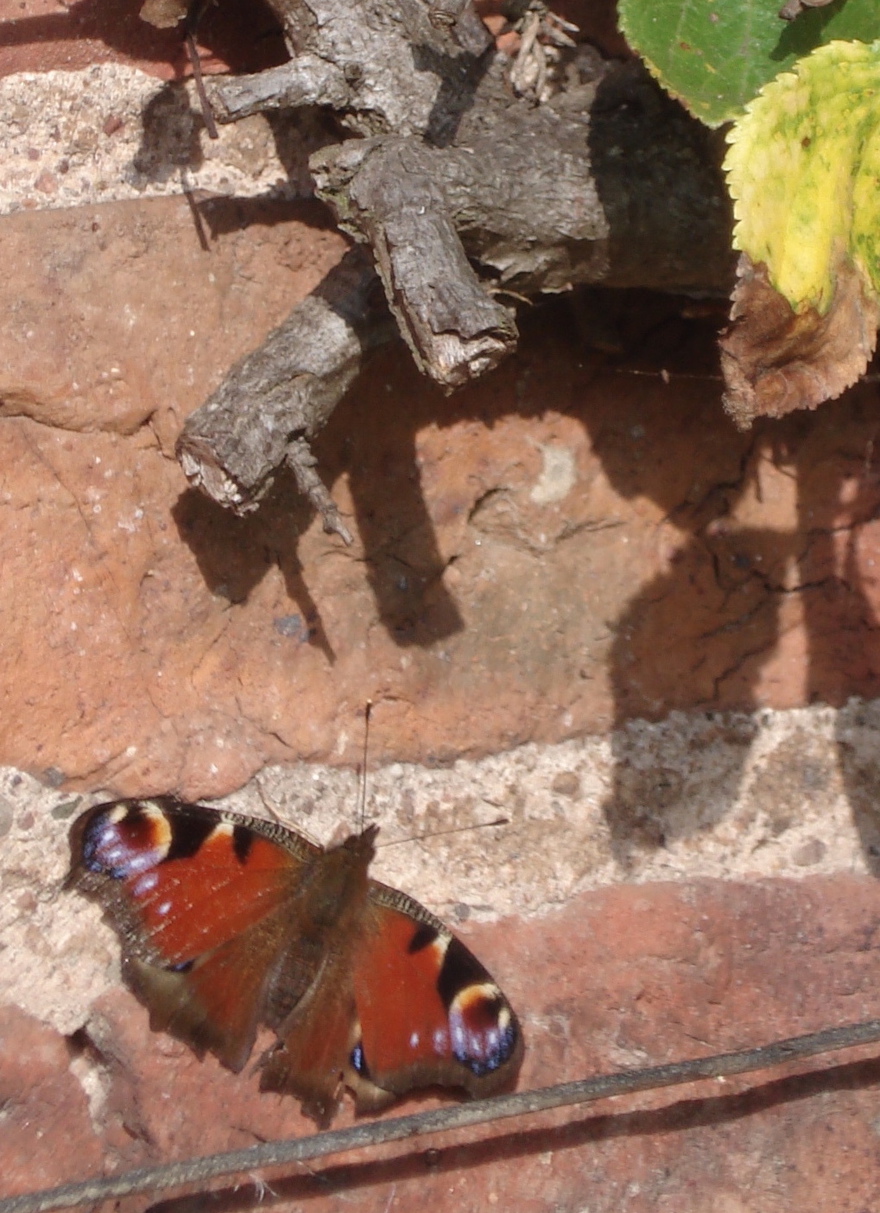
Pretty as a peacock: sunning itself on a wall
More than 60,000 people took part in the Big Butterfly Count 2017, spotting 550,000 insects of 20 target species between them. Unfortunately, its timing – people were asked to count butterflies for 15 minutes on any day between July 14 and August 6 – reckoned without this year’s weather. The warm spring brought butterflies out earlier than usual, and by the time of the count, numbers had been reduced by the wet summer. As a result, the average number of insects seen was the lowest recorded since the project began in 2010 – despite what looks to have been a better butterfly year overall. Only 10.9 individuals per count were recorded, down from 12.2 in 2016. However, this does not lessen the survey’s value, say the organisers; results can be adjusted to allow for weather variables, and research has shown that changes in butterfly populations estimated from Big Butterfly Count data match those from more intensive monitoring.
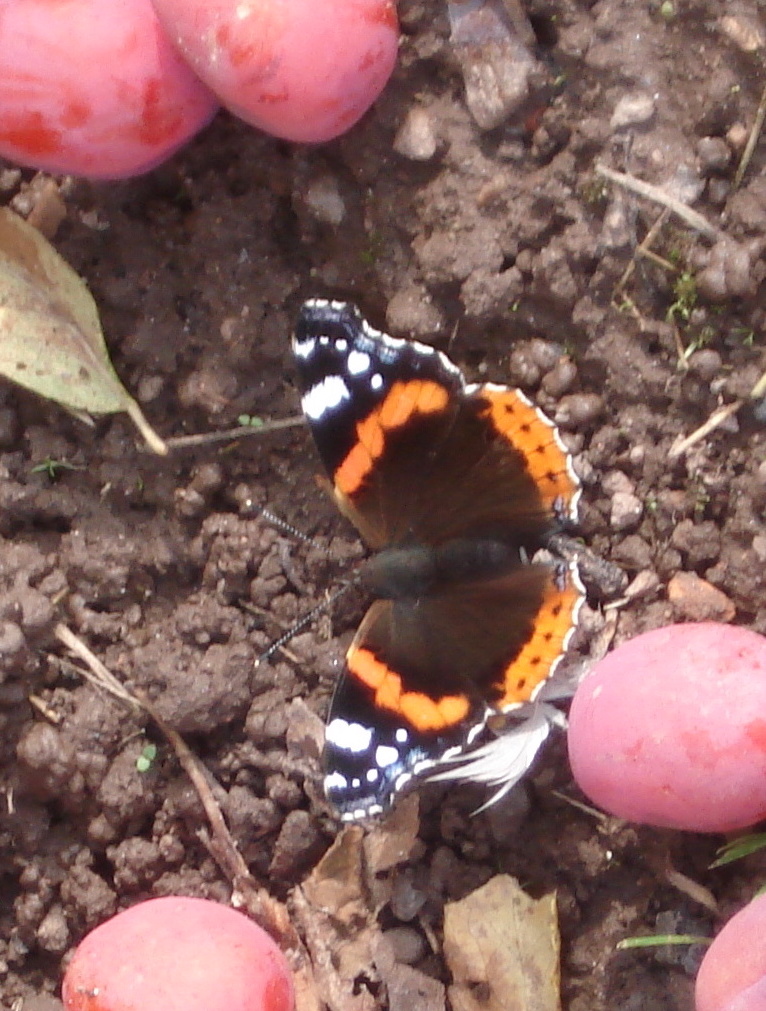
One of the stars of the summer was the red admiral (above). After a good year in 2016, numbers of this migratory butterfly soared in 2017. Numbers were up 75% compared with 2016 and threefold compared with 2015. Another winner was the comma, which bounced back strongly – up 90% – from a poor year in 2016. The common blue and small copper, both of which did very badly in 2016, also increased strongly, up 109% and 62% respectively, while the gatekeeper was up by 24%. However, numbers of the three common ‘whites’ – the butterflies about which gardeners have distinctly mixed feelings – all decreased from 2016, and there was no improvement for small tortoiseshells or peacocks, which remain at historically low levels.
Go to http://www.bigbutterflycount.org/2017mainresults to find out more.
More say no to neonicotinoids
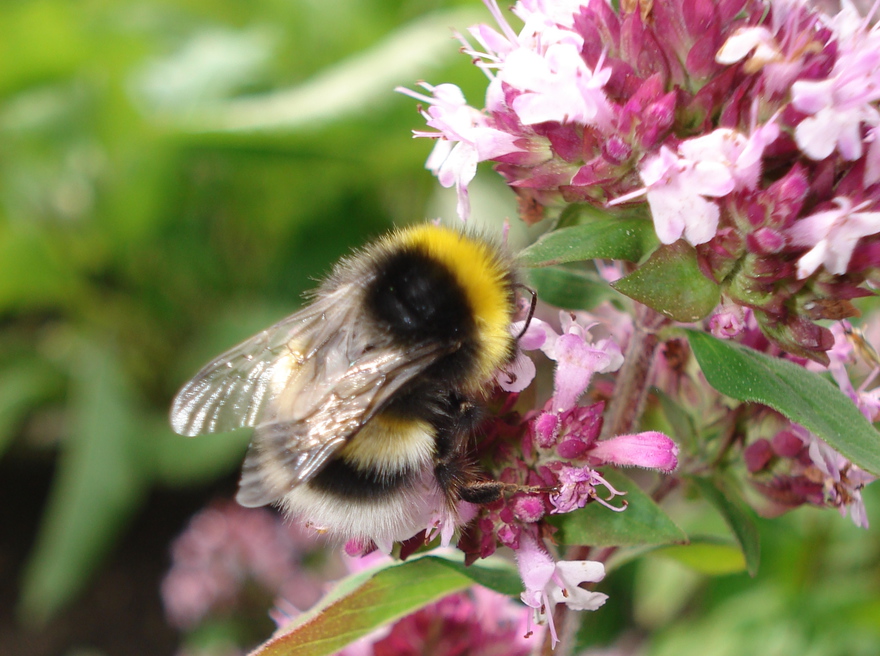
Help at hand: the busy bee is getting support from many UK garden retailers
Following the research by Professor Dave Goulson, published earlier this year, which revealed that most ‘pollinator-friendly’ plants from leading retailers contain neonicotinoids and other pesticides, nine of the 10 top UK garden retailers have now asked their suppliers to stop using the three neonics currently restricted by the EU. This is of course only a start – the plants tested by Professor Goulson contained a whole range of pesticides – but it’s progress.
A Friends of the Earth poll in May this year found that 78% of the British public agree that garden centres and retailers should not be selling plants grown with pesticides that are harmful to bees. FoE has now handed the Government a petition signed by more than 33,000 people, urging it to support a permanent, comprehensive ban on all bee-harming neonicotinoids.
FoE bee campaigner Nick Rau says: “We’re delighted that leading garden retailers are responding to public concern and mounting scientific evidence by saying ‘no’ to plants grown with bee-harming chemicals. People up and down the country have been creating pollinator-friendly gardens – they need to be confident that the plants they buy are not going to harm Britain’s bees. The UK Government must also act on neonicotinoids by backing a full and permanent EU ban on these chemicals across Europe – and pledging to keep any restrictions post-Brexit.”
Find out more at https://www.foe.co.uk/bees/homebase-urged-act-after-most-top-garden-retailers-say-no-beeharming-neonicotinoids
Gardeners bare all for charity
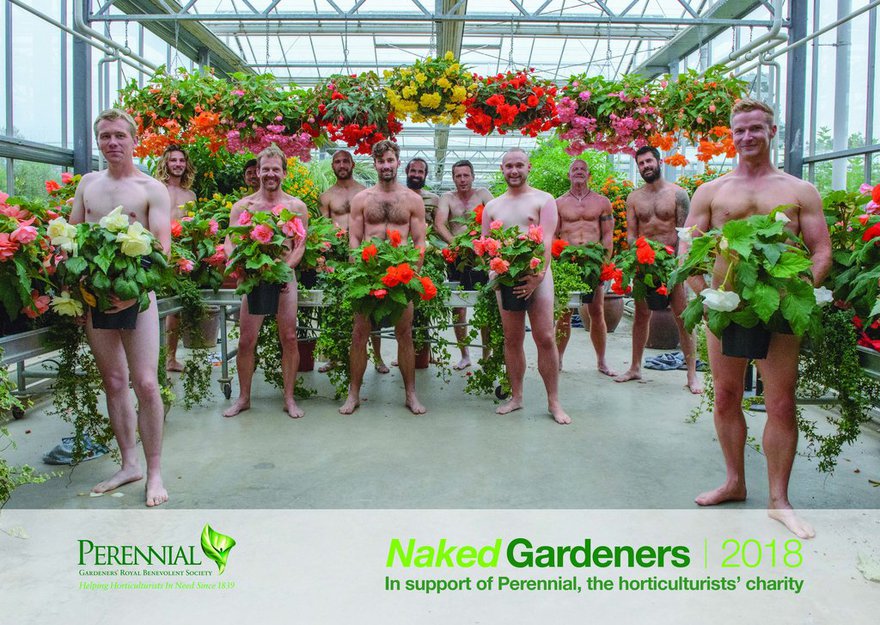
Bare essentials: Naked Gardeners 2018
The Grubby Gardeners calendar is back for 2018, so if you know a gardener with an appreciation of the finer points of the male horticulturalist, complete with strategically placed begonias – also cacti, topiary, watering cans and, worryingly, shears – this is the gift for them.
The Grubby Gardeners were recruited to fulfill a fundraising pledge made at Perennial’s 175th anniversary party. Four years on, the team is still going strong and has raised over £25,000 for Perennial, which is also known as the Royal Gardeners Benevolent Society. They’ve completed a range of fundraising challenges – some of them with clothes on – including a London to Brighton ride on a seven-seater bike and a ‘Dirty Dozen’ race featuring military-style obstacles and a lot of Kent mud.
The Naked Gardeners 2018 calendar costs £10, and previous years’ calendars have sold out, so order yours now at https://shop.perennial.org.uk/products/naked-gardeners-calendar-2018

